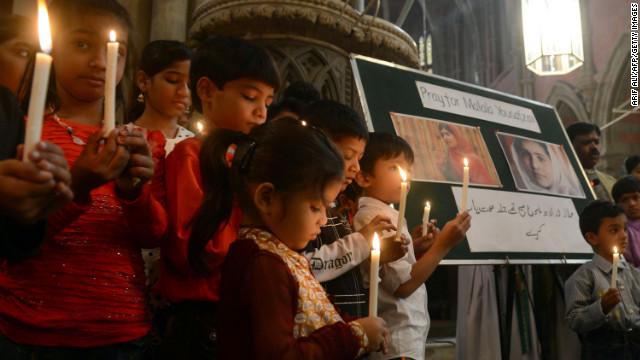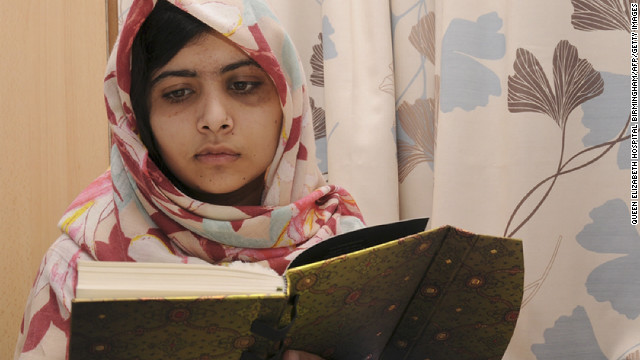Malala the 15year old heroine of our time!
Gunmen halted the van
ferrying Malala Yousafzai through her native Swat Valley, one of the
most conservative regions in Pakistan. They demanded that other girls in
the vehicle identify her. Malala had faced frequent death threats in
the past.
Some of the girls pointed
her out. At least one gunman opened fire, wounding three girls. Two
suffered non-life-threatening injuries, but bullets struck Malala in the
head and neck.
The bus driver hit the gas. The assailants got away.
Malala was left in
critical condition. An uncle described her as having excruciating pain
and being unable to stop moving her arms and legs.

Doctors fought to save
her life, then her condition took a dip. They operated to remove a
bullet from her neck. After surgery, she was unresponsive for three
days.
Now, it is nothing short
of a miracle that the teen blogger, who fights for the right of girls to
get an education, is still alive and even more astounding that she
suffered no major brain or nerve damage.
In hardly more than four
weeks, she went from an intensive care unit in Pakistan, showing no
signs of consciousness, to walking, writing, reading -- and smiling --
again in a hospital in the United Kingdom.
Less than three months
after being gunned down, she was discharged from the hospital to
continue her rehabilitation at her family's temporary home. Her father
is now employed at the Pakistani Consulate in Great Britain.
She is expected to undergo groundbreaking surgery in Birmingham, England to repair her skull.
And beyond her hospital
room, a world sympathetic with her ordeal has transformed her into a
global symbol for the fight to allow girls everywhere access to an
education.
The United Nations even
declared November 10, Malala Day as a day of action to focus on "Malala
and the 32 million girls like Malala not at school."
The Pakistani Taliban shot Malala
Malala has encouraged
girls and their families to resist the Pakistani Taliban, which pushed
girls from classrooms, since she was 11.
In January 2009, the
militants issued an edict ordering that no school should educate girls.
Malala wrote in her online diary about intimidation tactics the Taliban
used in the Swat Valley in northwest Pakistan to coerce girls into not
going school.
They included house raids to search for books, and Malala had to hide hers under her bed.
The extremists took issue with her writings and threatened to kill her.
"I was scared of being beheaded by the Taliban because of my passion for education," she told CNN last year.
Right after her
shooting, her family kept a low profile, for fear they could be next.
The militants vowed that if Malala survived, they'd go after her again.
"We will certainly kill her," a spokesman for the Pakistani Taliban said.
Global outpouring of support
The bloodletting sparked
outrage inside Pakistan against the radical Islamist group, which
continues to wield influence in parts of the country. Around the world,
the young blogger has become a poster child for a widespread need to
permit girls to get an education.
Initially, supporters in
Pakistan gathered for small vigils to pray for Malala's recovery.
Government officials in Peshawar, the main city in the northwestern
region where Malala is from, observed a minute of silence in her honor.
Public support snowballed, and thousands of people in Pakistan and elsewhere attended rallies honoring her courage.
Protesters in Karachi carried posters and banners reading: "Malala, our prayers are with you" and "Shame on you, Taliban."
The airwaves filled with
leaders and commentators who publicly got behind her, and journalists
closely followed her story, drawing death threats from the Taliban for
their coverage.
Army Chief Gen. Ashfaq Parvez Kayani took a stand from Malala's hospital, declaring: "We refuse to bow before terror."
Pakistan's first female
foreign minister, Hina Rabbani Khar, decried the attempted assassination
as "a wake-up call (to) a clear and present danger."
Interior Minister Rehman
Malik dubbed Malala "the pride of Pakistan" and announced that her
local school would be renamed for her, changing from "Khushal Public
School" to "Malala Public High School."
Authorities in Swat
renamed a college after her. Malala later requested that schools not be
named for her, to prevent them from becoming prominent targets for the
Pakistani Taliban.
The United Nations
launched a campaign for girls' education named "I am Malala."
Secretary-General Ban Ki-moon condemned the attack and praised Malala's
cause.
U.S. Secretary of State
Hillary Clinton commended the blogger's bravery; Actress Angelina Jolie
donated $50,000 to a charity in Malala's name. And singer Madonna
shouted her name from a stage, dedicating a song to her.
Malik proclaimed that
the two other girls injured in the attack on Malala -- Kainat Riaz Ahmed
and Shazia Ramzan -- will be honored with the third-highest military
award, the Star of Courage. It is not normally given to civilians.
Gordon Brown and Malala galvanize action
"Pakistan has a new heroine and a new cause -- a girl's right to education," former British Prime Minister Gordon Brown wrote in an opinion piece published by CNN.
Brown, who heads up the
"I am Malala" campaign in his role as United Nations special envoy on
global education, toured Pakistan to boost education with international
funding and local initiatives. It was his office that declared Malala
Day.
After her shooting,
Brown visited schools, including hers. He talked education for three
days with Pakistan's president, Cabinet ministers, educational
nongovernmental organizations, donors and a covey of U.N. charities.
Malala's path from near mortal wound to recovery
In addition to removing
the bullet, doctors extracted a piece of skull to relieve pressure on
Malala's brain because of swelling. Malala was taken by helicopter from
one military hospital in Pakistan to another, where doctors placed her
in a medically induced coma, so an air ambulance could fly her to Great
Britain for treatment.
"She is lucky to be
alive," Dr. Dave Rosser, the medical director of University Hospitals in
Birmingham, UK, told reporters after her arrival.
Then came the light at the end of the tunnel. Examinations revealed that Malala suffered no major neurological damage.
More than a week after
being shot a world away, Malala got back on her feet again, able to
stand when leaning on a nurse's arm at Queen Elizabeth Hospital in
Birmingham. Eager to communicate, she wrote sentences on paper -- she
couldn't talk at first because of a tracheotomy.
"Malala is a strong
young woman and has worked hard with the people caring for her to make
excellent progress in her recovery," Rosser said on her release.
She has returned to her
family and continues therapies as an outpatient at the hospital where
she will undergo further surgery on her skull.
Chasing the perpetrators
Malik, the Pakistani
interior minister, quickly placed a $1 million bounty on the head of
Pakistani Taliban spokesman Ehsanullah Ehsan, after he claimed
responsibility for Malala's attack on behalf of the group.
Police immediately took
the van driver and the school guard into custody for questioning and
rounded up dozens in the course of the investigation.
They have identified the
shooters as two boys, but their main suspect is an adult, who the
police say drove the youths to the scene -- Atta Ullah Khan, 23. All
three were at large.
In an interview with CNN, Khan's sister apologized to Malala for his alleged involvement.
"What he did was intolerable," Rehana Haleem said. "I don't consider Atta Ullah my brother anymore."
She called Malala her sister.
What's next for Malala?
After regaining
strength, Malala is now set to endure more surgery. Doctors at Queen
Elizabeth hospital will replace the piece of skull extracted in
Pakistan. Her lead doctor, Dr. Rosser, "does not envisage any
difficulties" in a pair of operations to repair her skull or fix the
hearing in her left ear, he said Wednesday.
Malala is no stranger to recognition, and her ordeal has boosted it to global proportions.
She has penned her
online diary in cooperation with the BBC in the past, and has spoken to
other media, including CNN. At home, her writings led to her being
awarded Pakistan's first National Peace Prize in late 2011.
From her hospital room
in the UK, Malala asked early on for her school books, so she could
study for exams she wants to take when she arrives back home in
Pakistan.
She is all about education.
The interesting and inspiring thing about Malala is that it can be any one of us simply standing up for change,not giving up in what you believe in,aspiring to cause a transformation,it can start with a small step.
Are you inspired by Malala and her heroism?

Woww such braVery
ReplyDelete